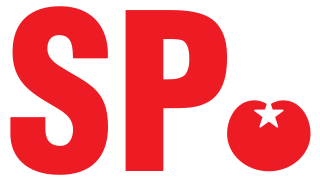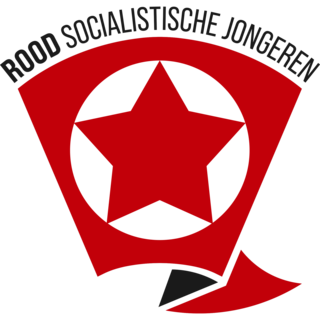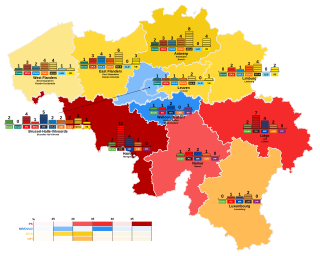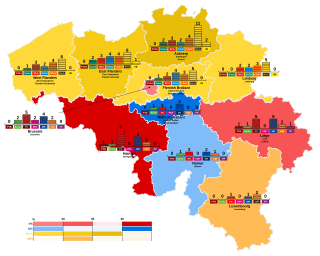
The Open Flemish Liberals and Democrats is a Flemish conservative liberal political party in Belgium. A smaller fraction within the party has social liberal views.
Vooruit is a Flemish social democratic political party in Belgium. It was known as the (Flemish) Socialist Party until 21 March 2021, when its current name was adopted.

Groen, founded as Agalev, is a green Flemish political party in Belgium. Its French-speaking equivalent is Ecolo; the two parties maintain close relations with each other.

Sociaal-Liberale Partij was a Belgian Flemish political party formed after dissolution of the moderate nationalist People's Union (Volksunie) party. Prior to 19 April 2008 it was known as Spirit, and intermediately as Flemish Progressives (VlaamsProgressieven). The party merged with Groen in the end of 2009, ceasing to exist.

The Socialist Party is a democratic socialist and social democratic political party in the Netherlands. Founded in 1971 as the Communist Party of the Netherlands/Marxist–Leninist, the party has since moderated itself from Marxism–Leninism and Maoism towards democratic socialism and social democracy. The SP has also been described as left-wing populist, far-left and Eurosceptic, and is an advocate of Dutch republicanism.

Frank Ignace Georgette Vandenbroucke is a Belgian-Flemish academic and politician of Vooruit who has been serving as Deputy Prime Minister and Minister of Health and Social Affairs in the government of Prime Minister Alexander De Croo since 2020.

Flanders is both a cultural community and an economic region within the Belgian state, and has significant autonomy.

Flemish political parties operate in the whole Flemish Community, which covers the unilingual Flemish Region and the bilingual Brussels-Capital Region. In the latter, they compete with French-speaking parties that all also operate in Wallonia. There are very few parties that operate on a national level in Belgium. Flanders generally tends to vote for right-wing, conservative parties, whereas in French-speaking Belgium the socialist party is usually the most successful one.

Louis Marie Joseph Tobback is a Belgian politician. Tobback is a Flemish social democrat and member of the political party SP.A. He was the mayor of Leuven (1995–2018) He graduated in Romance philology at the Vrije Universiteit Brussel. He is the father of Bruno Tobback, the former president of the Flemish socialist party Different Socialist Party (SP.A).

The Belgian Socialist Party was a social-democratic political party which existed in Belgium from 1945 to 1978. During its time in office, a number of progressive social reforms were introduced.

Federal elections were held in Belgium on 10 June 2007. Voters went to the polls in order to elect new members for the Chamber of Representatives and Senate.

ROOD, socialistische jongeren is a Dutch revolutionary socialist youth organisation. It was the youth wing of the Socialist Party until 2021, and was previously known as ROOD, jong in de SP.
Purple is a common term in politics used to describe governments or other political entities consisting of parties that have red and blue as their political colours. It is of particular note in three countries. In the politics of the Netherlands and Belgium, purple is the term for a government coalition of social democrats and liberals, excluding christian democrats. It is derived from the combination of the colour of the social democrats (red) and liberals (blue).
Roman/Red is the nickname for a period in Dutch politics between approximately 1945 and 1958. This period was characterized by coalitions between the Catholic and social-democratic parties in the Netherlands and Belgium. "Roman" refers to the parties with Roman Catholic affiliation, and "red" refers to the colour associated with social democrats. During the Roman/Red period, the Catholic People's Party (KVP) and the social-democratic Labour Party (PvdA) formed the core of several 'Roman/Red' cabinets, led primarily by Willem Drees.
De Bruyn is a Dutch and Afrikaans surname. "Bruyn" or "bruijn" is an archaic spelling of "bruin", meaning "brown". People with the name include:

Federal elections were held in Belgium on 13 June 2010, during the midst of the 2007-11 Belgian political crisis. After the fall of the previous Leterme II Government over the withdrawal of Open Flemish Liberals and Democrats from the government the King dissolved the legislature and called new elections. The New Flemish Alliance, led by Bart De Wever, emerged as the plurality party with 27 seats, just one more than the francophone Socialist Party, led by Elio Di Rupo, which was the largest party in the Wallonia region and Brussels. It took a world record 541 days until a government was formed, resulting in a government led by Di Rupo.

The Di Rupo Government was the federal cabinet of Belgium sworn in on 6 December 2011, after a record-breaking 541 days of negotiations following the June 2010 elections. The government included social democrats (sp.a/PS), Christian democrats (CD&V/cdH) and liberals, respectively of the Dutch and French language groups. The government notably excluded the New Flemish Alliance (N-VA), the Flemish nationalist party which achieved a plurality and became the largest party. Its absence, together with the unwillingness of Open Vld to enter into an eight-party coalition that included the green parties, caused the government coalition to lack a majority in the Dutch language group. It was the first time that the Belgian prime minister had been openly gay, as Di Rupo became the world's first male openly gay head of government. Elio Di Rupo also became the first native French-speaking prime minister since 1979 and the first prime minister from Wallonia since 1974 and first socialist prime minister since 1974.
The sixth state reform in the federal kingdom of Belgium is the result after the 2010–2011 Belgian government formation, with 541 days of negotiations, the longest ever in Belgium and possibly the world. The agreement was made among the Christian-democratic CD&V and cdH, social-democratic sp.a and PS, liberal Open Vld and MR and ecologist Groen! and Ecolo, each respectively a Flemish and French-speaking party. The first six parties, therefore not including the green parties, then formed the Di Rupo I Government. The Flemish nationalist party New Flemish Alliance, which became the largest after the 2010 elections, is notably not part of the agreement nor of the government coalition.

Federal elections were held in Belgium on 25 May 2014. All 150 members of the Chamber of Representatives were elected, whereas the Senate was no longer directly elected following the 2011–2012 state reform. These were the first elections held under King Philippe's reign.